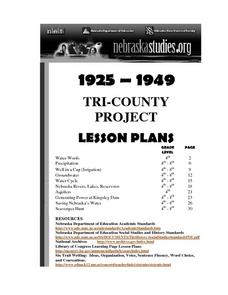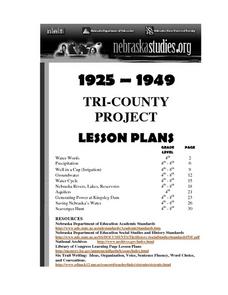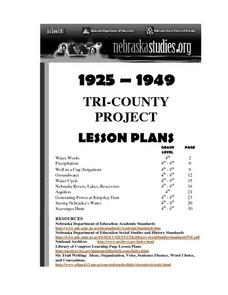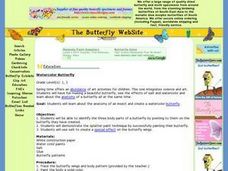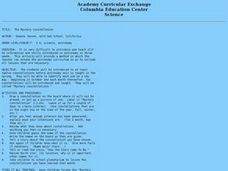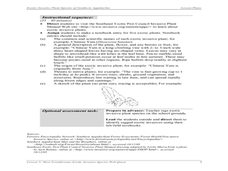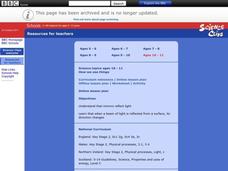Curated OER
"Tri-County" Project--Rivers Lakes Reservoirs
Students examine data about the rivers, lakes, and reservoirs in the state of Nebraska. An understanding of the political implications of boundaries is developed.
Curated OER
Tri-County Project: Precipitation
Students examine and research the annual rainfall in Nebraska. They create a map of the annual rainfall in Nebraska and use the map to develop explanations of settlement.
Curated OER
"Tri-County" Project--Water Cycle
Students analyze the parts of the water cycle through research and experimentation. Particular attention is paid to the processes of evaporation and condensation.
Curated OER
"Tri-County" Project--Well in a Cup
Students construct a model of a well to identify how water is brought to the surface. Signs of pollution are investigated.
Curated OER
Grasshopper Plague
Students study grasshoppers and Mormon crickets by visiting website to view images and listen to sound. They research the issue of serious insect infestation. They read about students who eat the insects as snacks and read insect recipes.
Curated OER
Watercolor Butterfly
Students identify and analyze the anatomy of an insect and create a watercolor butterfly. They identify the three body parts of a butterfly by pointing to them on the butterfly they have created and demonstrate the splatter paint...
Curated OER
Introduction to Gas Chromatography
Students analyze gas chromatograms and suggest various applications for gas chromatography.
Curated OER
The Mystery Constellation
Learners decipher two teacher chosen mystery constellations a month. They listen to stories, explain what they know about constellations and name the mystery constellation.
Curated OER
Pond Exploration
Students take a hands-on approach to explore the world beneath the water in this activity. They examine the creatures they catch to study about the adaptations these animals have that allow them to survive in this harsh environment. They...
Curated OER
Insect Biodiversity
Students observe the process of transect sampling using insect nets, to get a chance to compare the presence of different species and populations in various vegetational areas. They study the different specimens caught and compare their...
Curated OER
Living, Non-Living Mobile
Middle schoolers are introduced to the concept of living and nonliving organisms in general and participate in a starter activity where they build their own definitions of living and nonliving organisms.They sort organisms into living...
Curated OER
The Effect of Tides & Elevation on Wetland Plant Communities
Students comprehend how tides can impact shoreline plant communities through the study of a freshwater tidal marsh. They use actual tidal data to show that tidal ranges differ among geographic locations, even those relatively close...
Curated OER
Most Troublesome Exotic Invasive Plant Species Web Quest
Learners participate in a Web Quest activity in which they identify common exotic invasive plant species of the Southern Appalachian Region. After identifying the top 10 exotic invasive species, they choose one to research in depth.
Curated OER
A Change of Climate
Students research various sources to learn about global warming. They then create a multimedia presentation about global warming. They take a stance on the issue and present that as well.
Curated OER
Ourselves
Students use a website to name and compare external body parts of humans and other animals.
Curated OER
Sound and Hearing - Internet Research
Pupils use a website to help them recognize that sound is generated in a variety of ways and from different sources. They determine that sounds vary in tone and loudness, and learn there are different ways to describe sound.
Curated OER
Moving and Growing
Students know that humans and some other animals have bony skeletons inside their body. They know that other animals have skeletons on the outside of their bodies. They explain the role of both kinds of skeletons.
Curated OER
Helping Plants Grow Well
Pupils explain the effect of water, temperature and light on plant growth.
Curated OER
Micro-organisms
Students examine how micro-organisms are living organisms that are often too small to be seen. They explain that micro-organisms may be beneficial or harmful.
Curated OER
Forces in Action
Students ask questions that can be investigated scientifically. They determine how to plan a fair test by changing one factor while keeping other factors the same, to use measurements to draw conclusions and use scientific knowledge to...
Curated OER
How We See Things
Young scholars explain that mirrors reflect light. They examine how when a beam of light is reflected from a surface, its direction changes.
Curated OER
Autumn
Students examine the cycle of nutrients in a forest. They research the concepts of decomposing and recycling within a forest.
Curated OER
Grizzly Habitat
Students find areas on playground where they would live if they were a grizzly bear, share their reasons for their choice, talk about habitat areas, and choose their sites again, based upon new information.
Curated OER
Plant Growth
Students explore the parts of a plant and seed. They plant seeds and observe the growth of plants. Students record the observations. They discuss and share the observations they see.


